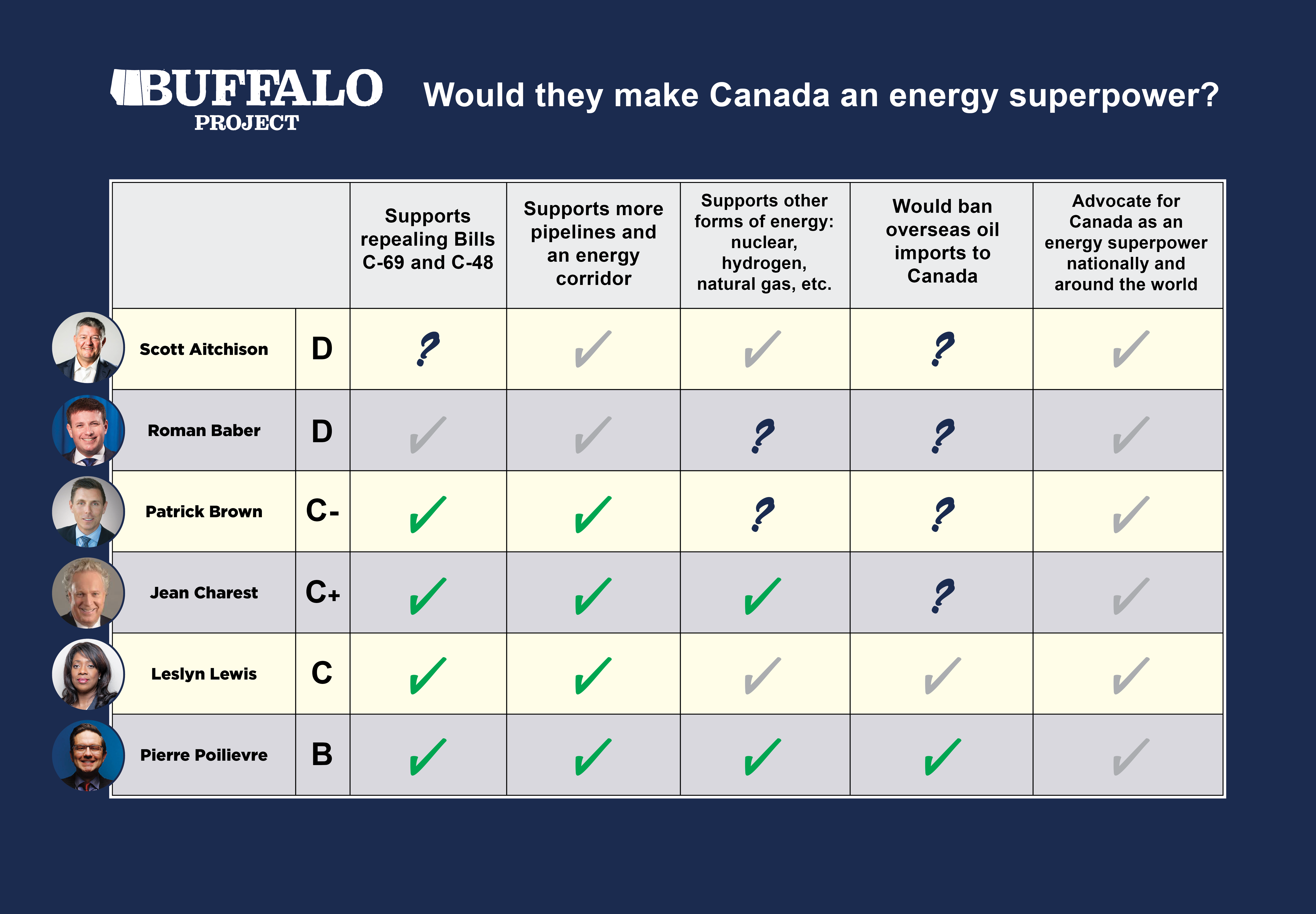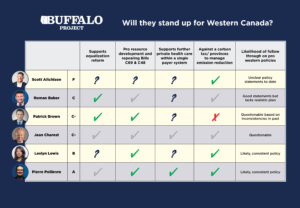We believe Canada needs to be an energy superpower, in oil and natural gas, uranium, hydrogen, renewable power, rare earth minerals, and more. The world relies on energy from dictators and bad actors hurting our environment. Canada is the solution and ought to be the modern, responsible, and reliable energy partner the world needs.
On this belief, all Conservative Party leadership candidates seem to agree. But how this task will be accomplished varies greatly across the campaigns.
There are also past actions to consider when determining if these candidates would actually fulfill their policy objectives, and the likelihood their approach could succeed in modern day Canada.
Thus, we’ve undertaken to grade each candidate on their policy statements, past actions, and approach on if they would transform Canada into an energy superpower.
Scott Aitchison
While Aitchison has spoken in broad terms about building pipelines, exporting Canadian energy, utilizing carbon capture technology and expanding the mining sector, there has been very little detail on how he will tackle these issues.
Interestingly, one of the few details Aitchison has offered up is his interest in appointing fellow leadership candidate, Pierre Poilievre, as Minister of Natural Resources.
We rank Aitchison a D. He will need to release more detailed information to increase his grade.
Roman Baber
Baber has indicated that he will introduce a “robust energy and natural resources plan”, but we have not seen any details so far.
He has spoken positively about building pipelines and repealing Bills C69 and C48, but we will need more information before raising his grade. Baber gets a D.
Patrick Brown
Brown’s Plan for Western Canada outlines efforts he will make to empower the Western Canadian energy sector within confederation. This includes repealing Bills C-69 and C-48, building a national energy corridor, and “aggressively” promoting Canadian energy abroad. He has said very little in the way of nuclear power, hydrogen power and other forms of energy.
He has expressed the importance of exporting Canadian energy abroad, particularly in relation to the war in Ukraine, but has not clarified his position on Canada importing oil from overseas.
Brown has certainly struck the right tone on the big picture issues, but is lacking detail overall. His history of changing his position on environmental policies like the carbon tax is also still troubling and many remain skeptical of him. Overall we give him a C-.
Leslyn Lewis
Lewis has been consistent in her support for the Canadian energy sector and its economic benefit for the country. She has outlined her stances on Canadian energy, is pro-pipeline, against Bills C-69 and C-48, and has said she will end oil imports. She has also spoken positively about furthering the development of nuclear power and LNG.
While Lewis has expressed great support for future development and expansion of the Canadian energy sector, we would like to hear more details on how she would achieve these goals.
Lewis is off to a good start, but until she outlines some concrete steps, she gets a C.
Jean Charest
In April, Charest released his Clean Ethical Canadian Energy policy, outlining his plan to expand and diversify Canadian energy while focusing on environmental sustainability.
This plan commits to repealing Bills C-69 and C-48, streamlining regulations and approvals for major infrastructure projects like pipelines, developing a “Critical Mineral Strategy” to expand the mining of lithium and cobalt, and collaborating with Indigenous communities on energy projects, all while aiming to achieve net-zero emissions by 2050.
While Charest has emphasized the need to export Canadian energy around the world, he has said very little about reducing or ending foreign imports of oil to Canada. It is unclear what his position is on this.
Charest’s plan offers plenty of detail with an environmental emphasis. It has the potential to appeal to a broader demographic of Canadians who list climate change as a top issue.
Some of Charest’s past actions do call him into question, however. As Quebec Premier, Charest brought in a carbon tax and halted exploration of shale natural gas. We have to ask, would Charest walk back some of his current campaign promises if politically convenient down the road?
Overall, strong positions and rationale policy on energy, but with skepticism that he would follow through. For that reason, we rank him overall a C+.
Pierre Poilievre
Poilievre has made pipelines and Canadian energy a focal point of his rallies throughout the campaign – promising to clear the way for pipelines “north, south, east, and west”.
He has committed to quickly approving major energy infrastructure projects, and repealing Bills C-69 and C-48. He has been a vocal advocate for the Bay du Nord and LNG Newfoundland and Labrador projects specifically. Poilievre has also expressed support for the Canadian mining sector, in particular, uranium in northern Saskatchewan.
He has reiterated the need to export Canadian energy to foreign markets in an effort to break Europe’s dependence on Russian oil. He has also committed to end importing oil from overseas within 5-years.
Poilievre has certainly presented himself as passionate, but is he promising too much? His intentions of upgrading the Port of Churchill is great on paper, but is much easier said than done. There are many logistical challenges around the northern Manitoba port which have called its viability into question and the need for massive government support.
Poilievre has also been very quiet on the environmental side of his policy. The issue of climate change is not going away, and ESG metrics are still a key consideration for investors. We’d like to know more about how he plans on balancing growth of the energy sector with environmental considerations.
We consider him to be the strongest candidate to promote Canadian energy by far but more nuance to his policy is needed.
Overall we grade Poilievre at a B.
* The table above may be updated upon further statements and clarity from candidates.





